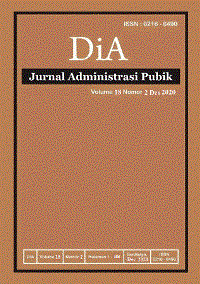POOR ACEH: THE IMPACT OF SPECIAL AUTONOMY AS EFFORT POVERTY REDUCTION IN ACEH
DOI:
https://doi.org/10.30996/dia.v18i2.3654Keywords:
Special Autonomy, Governance, Poverty, Aceh.Abstract
Special autonomy as one of the strategies in overcoming social welfare issues is one of them in Aceh Province. The implementation of regional autonomy after the reforms marked by the issuance of Law Number 33 of 2004 concerning the financial balance between the central government to the regions. The hope is to make the regions more autonomous or independent in government, and a more equal financial structure and the right to manage financial resources that are more transparent. This research focuses on the impact of the implementation of special autonomy in Aceh Province, limited from 2015 to 2019 in poverty alleviation efforts. This study uses a qualitative method with a descriptive approach to literature study and statistical data analysis. Data analysis techniques in this study were using statistical data analysis obtained from BPS. The results showed that special autonomy as an effort to reduce poverty in Aceh has a very good contribution because it has reduced poverty in Aceh from 819 thousand in March 2019 to 810 thousand people in September 2019. And the use of the special autonomy fund was channeled through programs made by the Aceh government in the fields of Education, Health, and the economy.
Downloads
References
Fatmawati, NI (2018). Asymmetric Decentralization, Alternative to the Future of Sharing Authority in Indonesia. Madani Political and Social Journal, 10 (3), 73–85.
Ifa, H., Yoga, D., Puspita, L., Mazidah, U., Geography, P., & Jember, U. (2016). Socio-Economic Analysis of the Welfare Level of the Tengger Mountain Bromo Community.
Ikhsan, I. (2015). Special Autonomy Relations and Poverty Reduction in Aceh Province. Journal of Public Policy.
Kamuli, S. (2010). Regional Autonomy in Strengthening National Integrity. Journal of Innovation, Vo.7 4 (ISSN 1693-9034 ), 240-255.
Kaunang (2016). Analysis of Regional Financial Management Performance and Level of Regional Independence in the Era of Regional Autonomy: A Study of the City of Manado (Year 2010-2014). Periodical Journal of Scientific Efficiency, 16 (2).
Kusumastuti, AE (2019). The Role of Women in Reducing Poverty. 1 (1), 39–46.
Lewerissa, CM (2019). Efforts to Program Family Welfare Development Activities Against Community Welfare Levels in Kaliharapan Village, Nabire District, Nabire Regency.
Lutfi. (2012). The Impact of Special Autonomy and Sharing of Oil and Gas (and Amigas) Results on the Poverty Reduction Program in Aceh.
Mccarthy, J., & Sumarto, M. (2018). Distributional Politics And Social Protection In Indonesia: Dilemma Of Layering, Nesting And Social Fit In Jokowi's Poverty Policy. Journal of Southeast Asian Economies, 35 (2), 223–236.
Mollet, JA (2014). Special Autonomy And Poverty Reduction Programs In Papua: Does It Work? 1–8.
Nur, S., & Susanto, H. (2019). Asymmetrical Decentralization in the Context of the Unitary State. Adminitrative Law & Governance Journal, 2 (4), 631–649.
Persico, C. (2020). Can Pollution Cause Poverty? The Effects of Pollution on Educational, Health and Economic Outcomes. Ssrn Electronic Journal.
Pratama, AY (2015). Asymmetric Decentralization in Local Governance in the Era of Democracy. Journal of Pancasila and Citizenship Education, 10 (1), 6-14.
Ramdhan, DA, Setyadi, D., & Wijaya, A. (2018). Factors That Affect Unemployment and Poverty Rate in Samarinda City. Innovation, 13 (1), 1.
Rante, Koenti, & S. (2018). Implementation of the Special Autonomy Law in Papua Province in Realizing the Welfare of the Papuan People. Janabadra.
Sakai, M. (2014). Solutions to Land Disputes in Indonesia's Era of Political Reform and Decentralization. Indonesian Anthropology, 0 (68).
Sangkek, A. & P. (2017). The Effect of Special Autonomy on Community Participation in Development in Sorong City. Gradual.
Santosa, P. (2010). Disintegration, Local Government and Central and Regional Balance Funds. Sociohumaniora, 12 (1), 12.
Saputra, B., & Mahmudi. (2012). Effects of Fiscal Decentralization on Economic Growth and Community Welfare Indonesian Journal of Accounting and Auditing, 16 (2), 185-199.
Sartika, C., Balaka, MY, Rumbia, WA, Department, M., Economics, I., Halu, U., ... Halu, U. (2016). Study of the Causes of Poverty in the Lohia Village Community, Lohia District, Muna Regency. Journal of Economics, 1 (April), 106–118.
Schwarz, A. (2018). A Nation In Waiting: Indonesia's Search for Stability. In A Nation In Waiting: Indonesia's Search For Stability.
Skonieczny, G., & Torrisi, B. (2008). The Influence Of Regional Autonomist Government In The Territory Environmental And Economic Performance. Wit Transactions On Ecology And The Environment, 108, 231–239.
Taftazani, BM (2017). Social Problems and Social Entrepreneurship. Share: Social Work Journal, 7 (1), 90.
Tossun, H. Dan. (2009). The Linkage Between Regional Autonomy And Economic Growth.
Werhane, PH, Kelley, SP, Hartman, LP, & Moberg, DJ (2009). Alleviating Poverty Through Profitable Partnerships: Globalization, Markets, and Economic Well-Being. In Alleviating Poverty Through Profitable Partnerships: Globalization, Markets, and Economic Well-Being.
Yanuarti, S. (2012). Poverty and Conflict in Papua Amid Abundant Resources. Journal of Political Research, 9 (1), 33–46.
Downloads
Published
How to Cite
Issue
Section
License
The DiA journal allows authors to retain the copyright of their papers without limitation. Authors may grant publishers non-exclusive publishing rights to publish articles. Granting first publishing rights to publishers also qualifies as unlimited copyright (because there are no restrictions imposed by publishers on author copyright).







